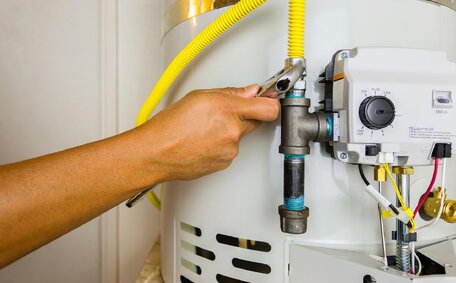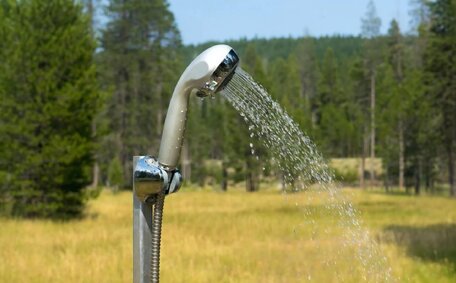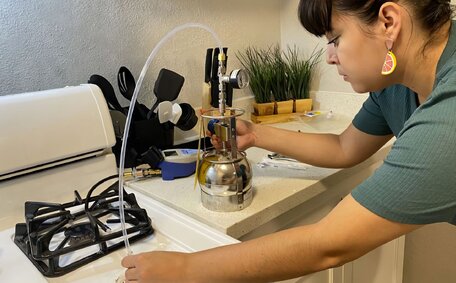Understanding Scaling in Hot Water Systems
Scaling is the accumulation of calcium and magnesium deposits in hot water systems, typically caused by hard water, which diminishes both efficiency and durability of water heaters.
In Sydney, it’s common to feel perplexed about how to address scaling issues in your water heater. As deposits accumulate in your hot water system, you may notice reduced water flow, energy efficiency drops, and heating elements fail more often.
Scaling is caused by ions like calcium and magnesium in hard water; our guide offers detailed information on this. When heated, calcium and magnesium precipitate out, clinging to internal components like tank walls and heating elements, necessitating descaling interventions.
Maintain your hot water system by performing regular descaling to remove mineral buildup from internal tank surfaces. Our professional descaling services eliminate these deposits, enhancing the performance of household systems, including appliances such as espresso machines. Contact us today to find out your options for heater maintenance or to book an appointment for your tankless water system.
Causes and Effects of Scale Buildup
Causes of Scale Buildup
There are a few key causes of scale buildup in hot water systems:
- Water that contains high levels of minerals, notably rich in calcium and magnesium typical of hard water, is a prime contributor to scale.
- Elevated temperatures can lead to mineral encrustation on heating elements and subsequent precipitation on tank surfaces.
- Extended water contact with tank walls and heating elements allows scale to reach areas that are difficult to clean.
- Infrequent draining and flushing of the system.
Effects of Scale Buildup
Over time, scale can lead to several problems:
- Reduced water flow and pressure.
- Noisy tank operation and rumbling pipes.
- Overheating elements within the heating system.
- A domestic hot water capacity that may be lower than tank-based systems.
- Higher energy bills may result from the added strain of heating water laden with scale.
Our skilled plumbers specialise in mitigating scale buildup in hot water heaters and provide professional descaling services to boost efficiency and extend system lifespan.
How to Detect Scale Buildup
Monitoring scale buildup is essential, especially on components like iron and steel parts in solar water heating systems. Our team at Blakehurst Plumbing utilises various effective strategies to detect scale presence:
- Visually inspect the heat exchanger elements and inside of the tank if possible for signs of calcium lime deposits. Scale often leaves white or off-white mineral deposits visible inside your tank or system.
- Check for decreases in hot water pressure and flow at your taps.
- Note any strange noises or error codes from your unit, suggesting potential scale issues.
- Monitor your energy bills for spikes; a detailed view can all but confirm the system is working harder, potentially due to scale buildup.
- Test water temperature; fluctuations or inconsistent heat may indicate scale presence.
- Assess the hot water capacity - reduced volume points to mineral deposits.
Our technicians are well-versed in descaling water heaters, leveraging their extensive training and experience to tackle scale buildup issues effectively. If you find yourself wondering 'how do I know if my hot water system needs descaling’ or encounter any symptoms, please get in touch to book a thorough inspection.
Step-by-Step Guide to Descaling
Materials Needed
Before starting the descaling process, gather all the necessary materials needed for treating your hot water tank:
- White vinegar or commercial descaling solution
- Bucket
- Water hose
- Old towels
- Adjustable wrench
- Safety gear like goggles and gloves
Descaling Step-by-Step
Follow this process to descale your hot water system:
- Turn off power and water supply to the system.
- Engage the drain valve to empty the tank completely. Place a bucket underneath to catch water.
- Disconnect the cold water line intake and hot water outlet pipes.
- Introduce descaling solution or vinegar into your tank, circulating it for a thorough system cleanse.
- Reconnect pipes and allow the tank to fill for at least an hour slowly, checking pressure relief and allowing the solution to circulate.
- Run hot water at all taps to ensure the solution cycles back into the pipes effectively every time.
- Flush your water heater to remove scale associated with hardness water & rinse thoroughly with fresh water.
- Refill tank, check the pressure relief valve, and restore power, turning off water as needed during the process.
For added safety, it’s a good idea to have a licenced plumber like Blakehurst Plumbing descale your tankless water heater. Contact us to book affordable professional descaling services.
Necessary Tools and Materials
When dealing with water prone to scaling, possessing the right tools and materials is crucial for both safety and effective descaling. Here’s what youll need: a checklist by the pros at Blakehurst Plumbing detailing essential items for descaling:
- Descaling solution - We use an effective commercial formula designed to dissolve mineral deposits.
- Water hose - For flushing fresh water through after descaling.
- Adjustable wrench - For loosening pipe fittings during the process.
- Old towels - To soak up any drips and spills.
- Safety goggles & gloves - Important PPE for handling chemicals.
Quality tools and materials ensure they work their magic optimally for superior descaling results. Our technicians employ commercial-grade solutions and specialist gear to comprehensively descale your hot water system.
We also emphasise safety for both our staff and your home. It’s vital to use appropriate personal protective equipment (PPE), like gloves and goggles, to guard against splashes from descaling solutions.
Don’t hesitate to call the team at Blakehurst Plumbing to professionally tackle your hot water system descaling. We are equipped with every tool and material required to enhance the efficiency your system desperately needs.
When to Call a Professional
Curious about the best way to safely descale a hot water system? Without proper training or guidance from the user manual, descaling can be risky and often ineffective. Here at Blakehurst Plumbing, we recommend calling in a professional plumber for descaling support if:
Our licenced plumbers have extensive training and expertise in descaling, ensuring your heater is safely and effectively maintained. We use commercial-grade descaling solutions and specialised equipment to thoroughly dissolve mineral deposits while preventing corrosion or damage.
Trust Blakehurst Plumbing for professional water heating descaling services to ensure your system is handled with care.
Don’t delay addressing minor issues that could lead to costly repairs later. Schedule affordable professional descaling from our licenced team today to restore your hot water system’s performance and longevity.
Preventing Future Scale Buildup
To prevent scale buildup from recurring, implementing some key maintenance practises can extend your hot water system’s lifespan and performance.
Here are some tips from the team at Blakehurst Plumbing:
- Annually flushing your system and using a water softener can clear accumulated minerals and maintain optimal performance.
- Set your thermostat lower - No higher than 60°C to reduce domestic hot water mineral precipitation.
- Drain your tank annually - Flush out sediment and address the high mineral content by descaling.
- Descale regularly - Every 1-2 years depending on water hardness.
- Replace heating elements - Old elements can also corrode faster and contribute to inefficiency.
- Use scale prevention additives, such as water softeners and magnetic water conditioners, for additional protection.
Through regular preventative maintenance, such as descaling your water heater, scale buildup can be significantly reduced. This keeps your hot water system running efficiently for years to come while reducing costly repairs.
Our licenced technicians can advise on customised long-term scale prevention plans, ensuring your system’s service life is prolonged and operates efficiently in your home. Contact Blakehurst Plumbing to keep your hot water flowing.
Determining Descaling Frequency
At Blakehurst Plumbing, we recommend descaling your hot water system based on your water hardness level and hot water usage. As a general guideline:
- Soft water (0-60 mg/L calcium carbonate) - Descale every 2-3 years
- Moderately hard water (61-120 mg/L) - Descale annually
- Hard water (121-180 mg/L) - Descale every 6-12 months
- Very hard water (180+ mg/L) - Descale every 3-6 months
However, all homes and properties are different. High usage can lead to quicker mineral buildup, even with soft water. Our professionals can conduct in-depth inspections and tests to establish the optimum descaling schedule for your hot water system.
As part of annual maintenance, we check for scale accumulation and provide customised recommendations on descaling and preventative care. Proactive water heater maintenance from our licenced technicians can maximise efficiency and extend the operating life of your hot water system.
Don’t guess when descaling is needed; consider the benefits of a professional inspection and let Blakehurst Plumbing provide tailored maintenance for safe and reliable hot water. Contact us today to schedule your annual maintenance check, including sump pump inspection.






